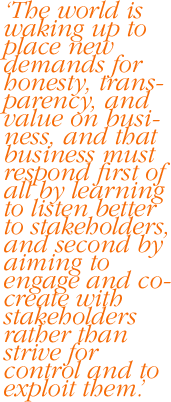

 |
 |
Chapter summary
Whose brand is it anyway?
Corporate transparency and integrity are currently hot topics, due to a series of well publicized accounting failures, conflicts of interest among accounting and Wall Street investment firms, and out of balance executive pay schemes. The resulting and related larger-context stories involve the worldwide erosion of confidence in multi-national (mostly American and EU-identified) corporations and their brands, and a wave of changing relationship dynamics among corporate stakeholders that promises to impact the way business managers do their jobs and the criteria by which their performance is evaluated.
The brands at the heart of this crisis in corporate confidence are not far away—they’re the brands consumers see in the market-place, the brands offering employment opportunities, the brands hoping to attract capital investors, the brands lobbying legislators for more favourable foreign trade protections and pollution standards. Other dissatisfied stakeholders like non-governmental organizations (NGO’s) and activist investor groups are increasingly opting-in (uninvited) to relationship with corporations to push for change using open access to media channels and brand awareness among consumer segments as primary weapons.
Yet despite all the hand-wringing and attention being given to corporate governance and restoring trust, the marketplace still seems somewhat uncertain about the actual business benefits of this trend. The causal relationships between corporate governance, corporate social responsibility, and business performance remain soft and poorly defined. In addition, corporate managers seem unprepared for the changes coming their way. Industrial-era ways of looking at and managing business functions are being challenged, yet new models and methods have not been developed to replace the old.
The authors of this book believe that corporate managers need a new framework that will help them make sense of an environment in which they and their brands will be judged by standards which are more complex, less financially driven, and more human than have been used in the past.
We believe these new standards will be more sensitive to multiple and sometimes competing value demands, not just financial growth and profit, and will reflect a growing understanding that corporate brands and performance are a result of dynamic and interdependent relationships among many stakeholder classes. In this view, brands are seen as systems of freely entered relationships among marketplace peers, rather than as objects to control.
Our book looks at the brand value scenario from the perspective of stakeholders—employees,
consumers, NGOs, investors, developing countries—and their needs
in relationship with a brand, rather than from the perspective of what
business wants (usually profitability or risk reduction). As co-authors,
we share the belief that the world is waking up to place new demands for
honesty, transparency, and value on business, and that business must respond
first of all by learning to listen better to stakeholders, and second
by aiming to engage and co-create with stakeholders rather than strive
for control and to exploit them.
Read more in the full book
